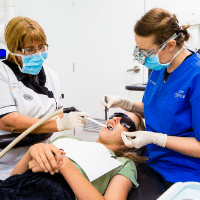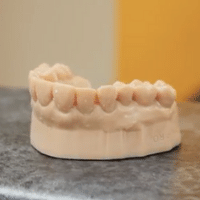Propolis Can Help Manage Gingivitis And Periodontal Disease

Propolis.
Bee glue.
The resinous tree, branch and leaf raw materials of certain plants that bees collect to make the complex chemical composition of propolis. Hard and brittle when it’s cold, soft and sticky when it’s hot, it’s used to protect the health and integrity of the colony.
There are various types of propolis. It’s a substance with uses as old as honey; a harvested staple of the ancients – Egyptian, Persian, Roman – in the treatment of disease.
A viscous and phenolic blend of waxes, fatty acids and resins. A material where origin and age designate colour: anywhere from a green beige, to any one of many coffee variations.
It contains almost twenty components, each characterised by a biological activity.
The antibacterial activity of propolis is mostly through flavonoids, terpenoids and phenolic compounds – long recognised as antioxidants and bioactive agents, with health and prevention benefits.
In particular, 50-60% of propolis is composed of resins and balms. 30-40% is made of waxes and fatty acids. 5-10% is essential oils, and 5% pollen. About 5% consists of other substances including amino acids, micronutrients, and vitamins – most particularly thiamin, riboflavin, pyridoxine, vitamin C, and vitamin E – all proven useful in the maintenance of good gum health.
Propolis is the only substance with anti-inflammatory, antioxidant, antibacterial, antifungal, anti-ulcer, anticancer and immunomodulatory properties.
Therapeutically, propolis lozenges, toothpastes and mouthwashes have been used for tooth decay and periodontitis in dentistry.
With more than 700 species of microorganisms in the oral microbiome, any change in this environment allows pathogens to colonise, giving rise to inflammation and infection.
Several studies have shown that propolis extract can inhibit the growth of damaging bacteria to the same degree as some antibacterial drugs and antiseptics. It has also been found to be beneficial in reducing the accumulation of dental plaque, and its anticariogenic potential is a focus of research.
Propolis has significantly reduced cavities in rats by inhibiting the synthesis of glucans and decreasing the growth of the most prevalent oral pathogens, including Streptococcus mutans, Candida albicans, and Actinobacillus commitans.
When used as a direct coating, it has also been successfully used in the treatment of dental pulp regeneration.
All in all, propolis seems a pretty sweet deal.

In treating periodontal disease, propolis has verified anaesthetic, anti-inflammatory, antibacterial and healing properties.
When used as an irrigator or as continual release patches, some studies claim that propolis stimulates gingival immune response and tissue recovery. As an anti-inflammatory, it inhibits the synthesis of prostaglandins: a group of lipids the body makes at infection and tissue damaged sites. Hormone-like, they control healing processes like blood flow and homeostatic function.
Chronic periodontitis affects almost 20% of the world adult population, amounting to about one billion people.
The most common treatment is the antiseptic Chlorhexidine but, in recent years, propolis has been studied and used in gels and toothpastes, and appears to offer even better results than Chlorhexidine.
The results indicate that propolis as a periodontal treatment is notably more effective than water-saline irrigation, placebo, and omega 3.
However, all research determines that further studies are needed in relation to dosage.
The challenge in routine use of propolis as an aid for improved dental health is the special care required in guaranteeing uniform chemical composition.
A variation in region and plant source is the difference in antimicrobial components; geographical location, harvesting season, and method of extraction are also important in standardising efficacy in a universal treatment for chronic periodontitis.
Organic Brazilian propolis has proven to contain one of the most excellent sources of bioactive compounds among those tested.
The constant and continuous use of synthetic antibacterials and antiseptics as part of the management of periodontal disease has created a resistance in pathogenic bacteria. Finding stable alternatives is now a priority.
Bee products have been intensely studied in health research. Honey, royal jelly, and even bee venom have shown promise in expanding treatment options for oral cavity infections and inflammation. Research continues to reveal the safe and therapeutic advantages of propolis gum disease treatment, identifiably reducing probing pocket depth and inflammation.
Propolis is a complex organic material. Its true structure and potential is yet to be fully understood in the prevention and treatment of one of the most common and damaging diseases in the world.
In the meantime, it is recognised as a beneficial adjunct to professional dental therapies for periodontitis. Available in sprays, toothpastes, mouthwashes and digestibles, propolis can be a useful inclusion in any daily dental hygiene habit.
The content has been made available for informational and educational purposes only. Plaza Dental does not make any representation or warranties with respect to the accuracy, applicability, fitness, or completeness of the content.
The content is not intended to be a substitute for professional personal diagnosis or treatment. Always seek the advice of your dentist or another qualified health provider with any questions you may have regarding a dental or medical condition. Never disregard professional advice or delay seeking it because of something you have read or seen on the Site.
Services we mentioned:
Related Articles
Tooth Sensitivity: Just Needs Sensitive Toothpaste, Or Symptom of Bigger Problems?
‘Sensitivity’ is the new buzzword in dentistry. Dentists are more sensitive than ever before to the needs of their...
Philanthropy in Dentistry: Dental Charities Have a Lot to Give
Australia is in the midst of a cost of living crisis following the global Coronavirus pandemic. It seems, as if...









